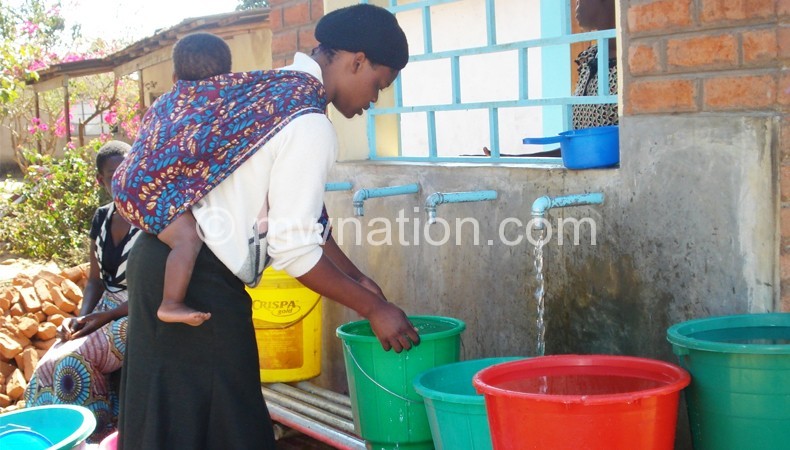No end in sight for Blantyre water woes
In Blantyre’s Nancholi Township, Charity Chiwaya wakes up every morning worrying about where to find water. With a husband and a baby, water is essential to her livelihood. But it has been two weeks since she last saw a drop of water from her taps, forcing her to resort to unsafe water sources. Living in her neighborhood has become a nightmare.
Blantyre Water Board (BWB) continues to struggle in its quest to provide safe water consistently to Blantyre City residents.

“Life has been a living hell here. I am forced to buy disposable diapers, which are expensive, as I cannot find water to wash matewera every day. We have to draw water from shallow wells or collect rainwater when it rains,” laments Chiwaya.
Water shortages in Blantyre are no longer news. In January this year, residents in the city went for weeks without water. Although the problem was rectified, some parts of Blantyre still continue experience water shortages.
During the historical water crisis, BWB set deadlines for water supply resumption which they failed to meet. It took the Minister of Agriculture, Irrigation and Water Development Allan Chiyembekeza to ask BWB to tell residents in the city the truth on the resumption of water supply during his visit to Walker’s Ferry Intake Pond.
“BWB should be careful what they tell people. We know people do not want to hear the truth. Do not make promises, but tell the people what is on the ground,” said Chiyembekeza.
According to BWB chief executive officer Henry Bakuwa, it was not their intention to be deceptive to the public.
“The estimates given to the public or consumers are the best estimates at the time of making them [estimates]. For instance, we can plan to start supplying water by such a date, but other issues come in and hamper the programme,” said Bakuwa.
The water situation is also being fuelled by residents near the water sources. Bakuwa says people have cut down trees around the catchment areas which help in retaining water.
“Due to farming activities along these areas, when it rains, silt settles in making it hard to pump water,” he says.
With Mudi Dam and Walker’s Ferry being the main intake points where BWB pumps its water, the situation becomes critical if both sources are affected.
BWB says it is looking at additional water sources such as Mulanje Mountain. Currently, according to Bakuwa, engineers are assessing the mountain, a potential water source for Blantyre and surrounding districts. He says the ministry is looking for funds for this project and that feedback is expected this month.
Besides the likely good news, the bad news is there is no specified time when the project will roll out. Should Blantyre residents suffer for months or years before the water woes end?
“An alternative solution BWB has is to take the Walker’s Ferry intake pond 4.3 kilometres up the Shire River to avoid the problem of siltation. World Bank is partly funding the project which is estimated at $160 million [about K73.6 billion]. The designs for the new intake pond are already underway,” says Bakuwa.
He further says over the last five years, BWB has, through a project financed by European Union (EU) and European Investment Bank, embarked on one major project to improve service delivery in the city.
“One of the deliverables of the project is to rehabilitate and increase the pumping capacity at Walker’s Ferry on Shire River. Once this project is through, all old equipment [mortars and pumps] will be replaced, thereby meeting the demand the city requires.
“Another project being funded by the World Bank involves the construction of reservoirs at Chimwankhunda, Kameza and Chigumula. BWB is envisaging a situation where there is more water production at Walker’s Ferry and to accommodate this increased production; it requires big enough reservoirs in the city of Blantyre. The two projects have been happening concurrently, but the reservoirs have overtaken the progress at Walker’s Ferry,” explains Bakuwa.
During the January water crisis, only Chimwankhunda was commissioned to operate. The other two are not yet commissioned, but once that happens, they will act as cushions for the supply of water,” he said.
Bakuwa said illegal connections are also a part of the challenges that BWB is facing as it affects the board’s operations and revenue.
“Normally, the board collects K600 million (US$1.3 million) a month. With the water challenges, the board is collecting K300 million (US$666 667) a month. Electricity, an essential ingredient in these operations, takes about K275 million (US$611 111) per month. This leaves the board with a little amount for its operations,” he said.
With these challenges, BWB continues to struggle in their quest to supply water consistently to Blantyre residents.





